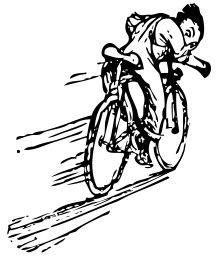Playful
Exploration
|
  |
Learning something new seems to be more difficult than it should as an
adult. Fortunately, while it seems to be a big problem, there is a
solution: Playful Exploration.
One of the great things about using playful exploration as you learn is
that it is something we all know how to do. It is normal. All children
use play and exploration to practice and learn almost everything. We
all know how to do it. As a matter of fact, many people prefer to
explore the available tools in suites like OpenOffice.org so that they
only learn what they need as they go along developing their set of
skills, one project at a time. Children build skills routinely. They
add new steps into what they already know. That's the big idea.
To a child, failure isn't seen as a terminal event. It is just a way to
find out you need more practice. All you need is motivation. That is
usually built into play. Children use play while learning anything.
I often hear adults say computers are “easy” for children. Children
expect to make mistakes. They are used to it. They don't normally get
stuck or give up because of every little failure. Children try again.
They change their approach and improve their skill. Eventually they get
good enough. Some even relish the challenge and compete to be better
than everybody else. Children naturally see skill development as an
ongoing process with no obvious end. They work to keep up with the
fastest, strongest, smartest friend they have. They don't even seem to
get very disturbed that they are not, themselves, best at everything.
When I teach, I try to use progressive challenges to get my students to
develop skills, letting them ask questions as they get stuck along the
way. I attempt to keep my answers from being too direct or complete.
While I don't often answer their questions with another question, that
“spirit” is in my mind as I try to point students in the right
direction to find the answer they need. I also try to let other
students be the source of an answer. Giving an answer reinforces two
things. First, the student needs to know the answer well enough to be
able to demonstrate the skill to another student. That reinforces the
learning of the “teacher”. Second, the student who gets the answer from
a peer is encouraged to know that someone like him can “do this”.
The ability to find an answer is a more important skill than knowing
the answer.
The reality is, there is just too much detail to teach for most
computer programs, no matter how good a teacher is. Getting students to
memorize ordered steps in a list seems good but ultimately fails. It
makes much better sense to learn the logic pathways of a program,
following from one menu option to another until you recognize what you
are looking for. Eventually, using a program over and over you do
memorize how a task works, but it is a result of practice.
Stuff we do over and over becomes habit. That's the goal. Knowing an
answer is important so that it pops in automatically when we need it.
This is what we expect when we learn to do many skills. Common examples
of habit-knowledge include riding a bicycle, driving a car, typing and
calculating basic math problems, even basic grammar in our native
language. Most adults recognize that they didn't learn any of these
skills quickly. Learning new skills as adults need the same investment
of time for practice and play.
One problem is “productivity”. We set expectations for ourselves or are
given them by bosses. We don't have or make time to practice. We are
expecting to be productive. “I should know how do this. Shouldn't it be
easier for me?”
The biggest problem is: We become adults. After some age, people get
the idea that making a mistake is just plain bad. We don't want to
sound stupid so we stop asking questions. We stop playing at the edge
of our skills so we won't be seen making a mistake. We stop growing and
stop learning.
Encourage adults to use “Playful Exploration” when they use computers.
Relax. Have some fun. Be child-like. Make mistakes. Try bunches of
things. Save fouled up experiments and try again. Throw stuff away.
Look around. Ask questions. Show somebody what you found out.
SHARE.
 Creative
Commons Attribution 3.0 License
Creative
Commons Attribution 3.0 License
You may also download the "source"
document in OpenOffice.org format or easy-to-print PDF format.




 Creative
Commons Attribution 3.0 License
Creative
Commons Attribution 3.0 License